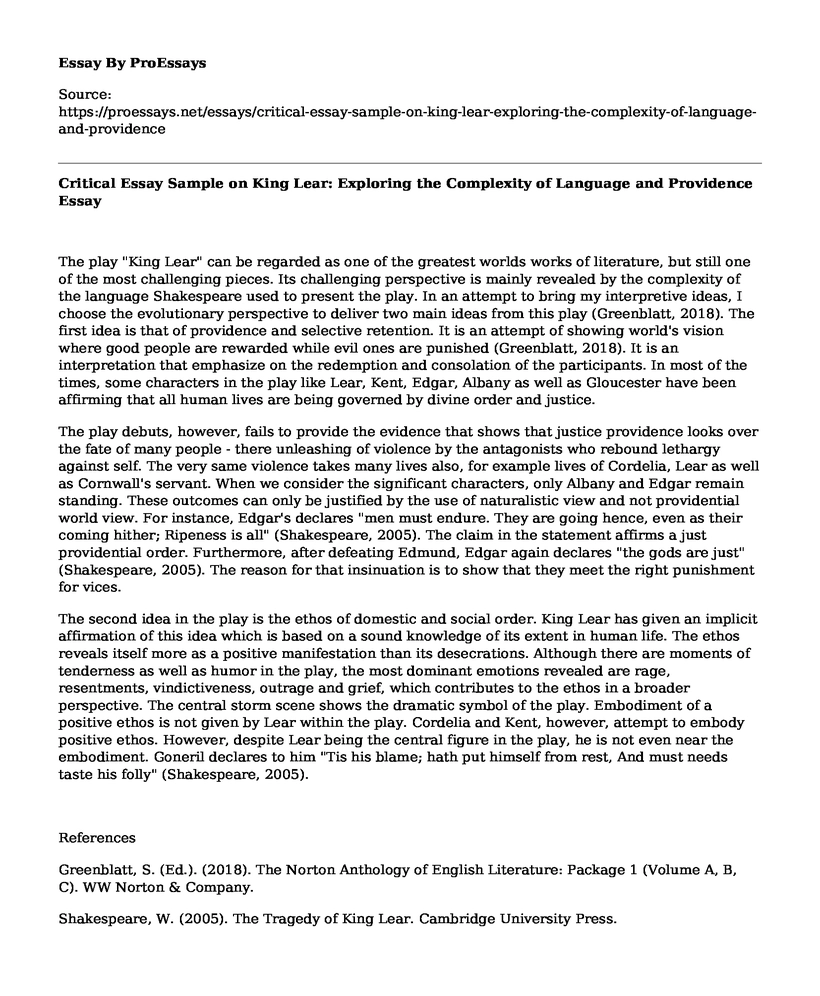The play "King Lear" can be regarded as one of the greatest worlds works of literature, but still one of the most challenging pieces. Its challenging perspective is mainly revealed by the complexity of the language Shakespeare used to present the play. In an attempt to bring my interpretive ideas, I choose the evolutionary perspective to deliver two main ideas from this play (Greenblatt, 2018). The first idea is that of providence and selective retention. It is an attempt of showing world's vision where good people are rewarded while evil ones are punished (Greenblatt, 2018). It is an interpretation that emphasize on the redemption and consolation of the participants. In most of the times, some characters in the play like Lear, Kent, Edgar, Albany as well as Gloucester have been affirming that all human lives are being governed by divine order and justice.
The play debuts, however, fails to provide the evidence that shows that justice providence looks over the fate of many people - there unleashing of violence by the antagonists who rebound lethargy against self. The very same violence takes many lives also, for example lives of Cordelia, Lear as well as Cornwall's servant. When we consider the significant characters, only Albany and Edgar remain standing. These outcomes can only be justified by the use of naturalistic view and not providential world view. For instance, Edgar's declares "men must endure. They are going hence, even as their coming hither; Ripeness is all" (Shakespeare, 2005). The claim in the statement affirms a just providential order. Furthermore, after defeating Edmund, Edgar again declares "the gods are just" (Shakespeare, 2005). The reason for that insinuation is to show that they meet the right punishment for vices.
The second idea in the play is the ethos of domestic and social order. King Lear has given an implicit affirmation of this idea which is based on a sound knowledge of its extent in human life. The ethos reveals itself more as a positive manifestation than its desecrations. Although there are moments of tenderness as well as humor in the play, the most dominant emotions revealed are rage, resentments, vindictiveness, outrage and grief, which contributes to the ethos in a broader perspective. The central storm scene shows the dramatic symbol of the play. Embodiment of a positive ethos is not given by Lear within the play. Cordelia and Kent, however, attempt to embody positive ethos. However, despite Lear being the central figure in the play, he is not even near the embodiment. Goneril declares to him "Tis his blame; hath put himself from rest, And must needs taste his folly" (Shakespeare, 2005).
References
Greenblatt, S. (Ed.). (2018). The Norton Anthology of English Literature: Package 1 (Volume A, B, C). WW Norton & Company.
Shakespeare, W. (2005). The Tragedy of King Lear. Cambridge University Press.
Cite this page
Critical Essay Sample on King Lear: Exploring the Complexity of Language and Providence. (2023, Mar 12). Retrieved from https://proessays.net/essays/critical-essay-sample-on-king-lear-exploring-the-complexity-of-language-and-providence
If you are the original author of this essay and no longer wish to have it published on the ProEssays website, please click below to request its removal:
- Witches Loaves Essay Example (O. Henry)
- Spanish Tragedy, Le Cid and All for Love Plays Essay
- The 'Power of Money' as Discussed in 'Raisin in the Sun' Essay
- Literary Analysis Essay on Maya Angelou's Poem, "Still I Rise": A Fight for Justice
- Analysis of Chaucer's Legend of Good Women Essay Example
- Essay Example on Everyday Use: Exploring Heritage & Values
- Essay Example on H.G. Wells's The Pearl of Love: Love, Loss, Devotion & Obsession







